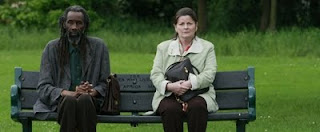 Chosen by Lucy and Tony
Chosen by Lucy and TonyIn a break from tradition, we made the most of the Christmas holidays to watch this film together.
The film
Kristin Scott Thomas plays Juliette, a forty-something woman who comes to live with her younger sister Léa, (Elsa Zylberstein). Juliette is grey, gawky, withdrawn - in contrast with Léa's vibrant life (especially her brilliantly-played older daughter). Gradually, subtly, we find out why the two have been parted for so long.
The response
The verdict: 'gripping'. True, not everyone was wholly convinced by the story-line, wondering whether Juliette's family really would have been oblivious to the situation she was in. And some of us spent the film waiting for a terrible denouement. But overall we found ourselves drawn into this carefully-crafted (and beautifully-filmed) depiction of pain, love, death and life.
This was another film that prompted questions. How well do we know the people we are closest to? What characterises sibling relationships? What is a 'criminal' act? How can people carry on living after experiencing terrible things? Perhaps it's enough to notice beautiful and meaningful things - as the sisters, together, recognised beauty and hope in a rain-covered windowpane.











